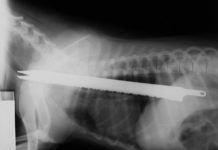Can Dogs Get Tetanus?
Fortunately, tetanus is relatively rare in dogs. Horses and humans are more susceptible to tetanus, while cats are highly resistant. Dogs fall somewhere in the middle of this spectrum but it does happen. As an emergency veterinarian, I have personally seen two cases of tetanus in dogs and read of several others.
Veterinary Visits: It’s Important to Be There for Your Dog
I am going to be blunt; I have a strong opinion about this. There is absolutely no chance that I would allow any of my dogs to be taken into the back" at a veterinary clinic for anything short of surgery. Our new vet does go above and beyond with her clinic's degree of owner involvement
How to Prepare for An Emergency Animal Hospital Visit
If you have a dog, emergencies are inevitable. Dogs are prone to injuries, ingestion of toxic substances, and illnesses. Are you prepared in an emergency? Do you know what to do and what not to do? After nine years as an emergency veterinarian, I've seen it all! Here are my top tips for helping your emergency-room veterinarian help your dog.
Diagnostic Health Testing for Dogs
Basic screening tests, in combination with regular physical exams, are foundation components of a good health care program. In younger dogs, routine tests are done to establish normal baselines, exclude congenital problems, and/or ensure safety for anesthesia. In older pets, these tests often provide the first indication of possible health problems.
12 Tips to Avoiding Trips to the Emergency Vet
Every year, thousands of dogs are treated in emergency veterinary hospitals across the country. I know; I spent nearly a decade as an emergency-room veterinarian. I always found it interesting that many of the most common injuries and illnesses I saw in emergency practice were also some of the easiest to prevent! Many of these problems can be avoided with a little common sense and preventative medicine.
Physical Exams for Senior Dogs
There are a number of ways that we can stay on top of health issues that creep up on our dogs with age. Annual veterinary visits are a staple in every healthy pet's life. A comprehensive physical exam from nose to tail is step one in picking up clues to underlying concerns at every age, but it becomes even more important in the senior years.
Dog Paw Cuts and Scrapes: How to Treat a Paw Injury
Your dog's paw pads act much like the soles of sneakers, protecting your dog's foot and cushioning each step. Paw pads are tough, but they can still be cut by sharp objects or worn off if your dog runs hard on rough terrain. What should you do when your dog cuts or tears a pad?
Get Your Dog to Rest After Surgery
Stay, and "Leave It." One can also work on increasing the duration of these behaviors at this time.üToss your dog's kibble onto a "snuffle mat" to increase the amount of time it takes him to sniff out and consume each nugget. These washable mats are easy to make or can be store-bought.üDr. Jessica Hekman uses trick training and scent-work exercises (seen here) to keep her usually busy English Shepherd
Hemangioma in Dogs
The cause of hemangiomas is idiopathic (unknown). These growths usually don't appear until at least middle age. Thin-skinned, light-colored breeds often experience hemangiomas. You'll most likely find a hemangioma on the dog's trunk or legs, especially hairless areas like the lower abdomen.
5 Steps to Safely Pull A Tick Off Your Dog
It's hard to say which is worse: running your hand over your dog and brushing against an attached tick, or seeing a tick skitter across your dog's face. Either way, the unwelcome arachnid must go. What should you do?
13 Household Items Toxic to Dogs
OK, we all know about #2. But many of these extremely common items are less hyped, and some are even ENJOYED by dogs!
Fecal Transplants for Dogs
A healthy microbiome destroys harmful pathogens, including disease-causing viruses, fungi, bacteria, and parasites. As a result, the microbiome is the immune system's first line of defense. Differences in microbiomes help explain why some dogs exposed to diseases like parvovirus, distemper, leptospirosis, Lyme disease, canine flu, heartworm, or kennel cough get sick while others remain symptom-free.



















